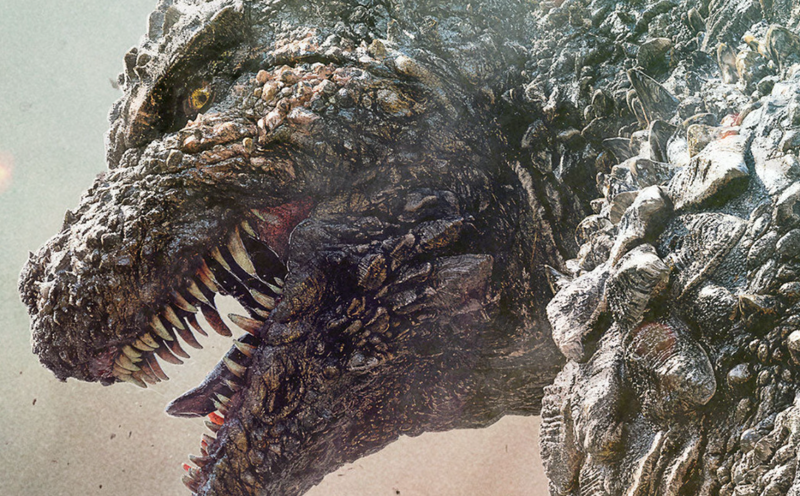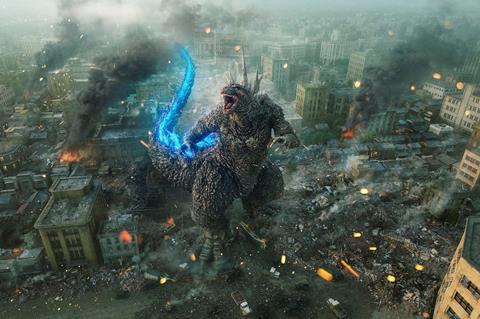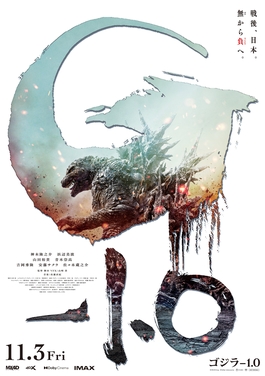A review by Cliff Homewood
Godzilla Minus One, a prequel to Godzilla but also calling losing WW2 nil and the nuclear desolation after minus one. Godzilla is traditionally thought of as a metaphor for Japan’s nuclear experience. After WW2, Japan’s army was disbanded, disarmament lasting until 1951. Not a good situation to meet Godzilla in…
This is the film I’ve been waiting for.
The Japanese rarely talk about World War 2. A highly regarded film reflecting their suffering is Grave of the Fireflies, better but lesser known is Barefoot Gen. When I heard that Godzilla Minus One was the story of a Kamikaze pilot with survivor guilt – with added Godzilla! – I was interested. I was concerned needlessly there might not be enough Godzilla in the film, although a prequel this feels like a remake. I’ve not seen the original Godzilla since I was a kid, and experience has taught me that memory cheats, and old films may disappoint.
 This is the great film I remember Godzilla being. It’s taut, masterful storytelling, each scene propelling forward and often providing emotional depth. It’s a film where the Japanese critique their rulers, for example, building planes without ejector seats. In its hero we have a man who has previously given into fear and thus feels unworthy of his life. Making him relatable, he’s human. Films must be dramatic, otherwise dull. You have to put your hero through the wringer. This felt like Trauma: The Movie. You have the pain of Tokyo emerging from WW2 and the death and devastation caused, add on top of this, Godzilla. The film works as a war metaphor: after losing WW2, this gives the Japanese something to beat, to hold their heads up high. People die easily in this film, stomped or chomped by Godzilla, the attacks feel real and gritty. There’s a war-like feel to them. As Godzilla seems invulnerable to most of our weapons, brains not brawn has to be used to beat him. The one flaw for Godzilla fans is that he doesn’t show intelligence. In previous films he intelligently negated traps, in this he powerfully smashes through them. He’s perhaps so invulnerable that he doesn’t need to react, and this makes him feel unstoppable. Considering that I found the film emotionally intense, frequently having tears rolling down my face, and that it dealt with the spectre of WW2, I felt this was a small price to pay. It’s a contender for my film of the year.
This is the great film I remember Godzilla being. It’s taut, masterful storytelling, each scene propelling forward and often providing emotional depth. It’s a film where the Japanese critique their rulers, for example, building planes without ejector seats. In its hero we have a man who has previously given into fear and thus feels unworthy of his life. Making him relatable, he’s human. Films must be dramatic, otherwise dull. You have to put your hero through the wringer. This felt like Trauma: The Movie. You have the pain of Tokyo emerging from WW2 and the death and devastation caused, add on top of this, Godzilla. The film works as a war metaphor: after losing WW2, this gives the Japanese something to beat, to hold their heads up high. People die easily in this film, stomped or chomped by Godzilla, the attacks feel real and gritty. There’s a war-like feel to them. As Godzilla seems invulnerable to most of our weapons, brains not brawn has to be used to beat him. The one flaw for Godzilla fans is that he doesn’t show intelligence. In previous films he intelligently negated traps, in this he powerfully smashes through them. He’s perhaps so invulnerable that he doesn’t need to react, and this makes him feel unstoppable. Considering that I found the film emotionally intense, frequently having tears rolling down my face, and that it dealt with the spectre of WW2, I felt this was a small price to pay. It’s a contender for my film of the year.
Reviews are calling it the best Godzilla movie. They are probably right, and I would have to rewatch the original to be sure, which, incidentally, is getting a 4k release for its 70th anniversary next year. Gareth Edwards, director of 2014’s Godzilla, eyed this film with envy stating, “this is what a Godzilla movie should be”.
 Not everyone wants a film showing Japanese cultural differences. Some just want a monster movie and whereas I felt it delivered, my friend was disappointed in a dumb Godzilla with predictable story beats. Whilst there are some predictable moments I did not know where the film was taking me one moment to the next and I enjoyed seeing Godzilla trampling cities and being a general hard bastard. The director’s favourite Godzilla movie is Godzilla, Mothra and King Ghidorah: Giant Monsters All-Out Attack (2001) and the film shows many similarities (for those that want to get geeky).
Not everyone wants a film showing Japanese cultural differences. Some just want a monster movie and whereas I felt it delivered, my friend was disappointed in a dumb Godzilla with predictable story beats. Whilst there are some predictable moments I did not know where the film was taking me one moment to the next and I enjoyed seeing Godzilla trampling cities and being a general hard bastard. The director’s favourite Godzilla movie is Godzilla, Mothra and King Ghidorah: Giant Monsters All-Out Attack (2001) and the film shows many similarities (for those that want to get geeky).
Godzilla Minus One is like a Japanese Jaws but with something a bit bigger than a large fish to deal with. Godzilla snaps warships like twigs, making our heroes’ vessel feel tiny and vulnerable against this immense force of nature. It’s not ‘we are going to need a bigger boat’ but ‘we need to get the f- out of here!’
You’ve read this review now go read the subtitles. And consider how often is a subtitled film deemed worthy of national release?

